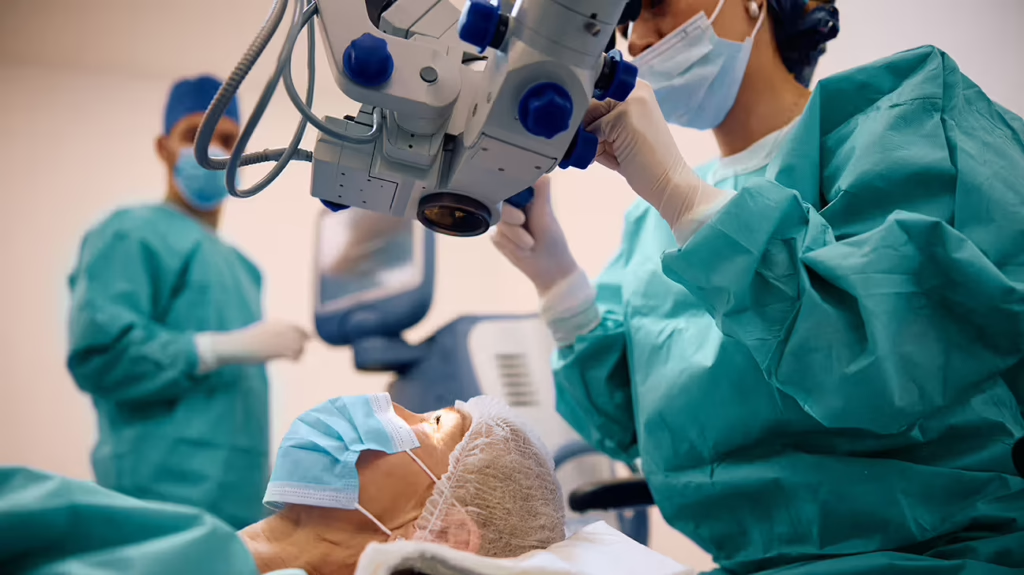Before undergoing laser eye surgery, it is important to take certain steps to ensure that you are fully prepared for the procedure. Understanding the basics of laser eye surgery, assessing your eligibility, and going through a pre-surgery consultation are all crucial aspects of the preparation process. Additionally, both physical and emotional preparation play significant roles in ensuring a successful surgery and recovery. In this article, we will explore each step in detail to help you navigate the pre-procedure phase of preparing for laser eye surgery.
Understanding Laser Eye Surgery
When considering laser eye surgery, it is essential to have a clear understanding of what it entails. Laser eye surgery is a procedure designed to correct vision problems such as nearsightedness, farsightedness, and astigmatism. During the surgery, a laser is used to reshape the cornea, the clear front surface of the eye, in order to improve how the eye focuses light. This ultimately enhances vision and reduces the need for glasses or contact lenses.
Preparing for best laser eye surgery involves several important steps, both physically and emotionally. By understanding the basics of the procedure, assessing your eligibility, going through a pre-surgery consultation, and preparing yourself both physically and emotionally, you can ensure that you are fully prepared for the life-changing experience of laser eye surgery.
The Basics of Laser Eye Surgery
Before delving into the specifics of laser eye surgery, it is important to have a basic understanding of the procedure. The most common types of laser eye surgery include LASIK (Laser-Assisted In Situ Keratomileusis) and PRK (Photorefractive Keratectomy). Both procedures aim to reshape the cornea using a laser, but they differ in how the corneal tissue is accessed.
LASIK involves creating a thin flap on the cornea, which is lifted to access the underlying tissue. The cornea is then reshaped using a laser, and the flap is placed back into position to heal naturally. This technique has gained popularity due to its quick recovery time and minimal discomfort experienced by patients.
On the other hand, PRK involves removing the outer layer of the cornea to access the tissue underneath, which is then reshaped using a laser. The removed layer regenerates over time, and although the recovery period is longer compared to LASIK, PRK is a suitable option for individuals with thinner corneas or those who are not eligible for LASIK due to certain factors.

Different Types of Laser Eye Surgery
While LASIK and PRK are the most commonly performed laser eye surgeries, there are other variations that may be suitable for certain individuals. These include LASEK (Laser-Assisted Subepithelial Keratectomy), Epi-LASIK (Epithelial Laser In Situ Keratomileusis), and SMILE (Small Incision Lenticule Extraction).
LASEK and Epi-LASIK are similar to PRK but involve the use of a special solution to loosen the outer layer of the cornea, making it easier to remove and preserve during the procedure. These techniques are often preferred for individuals with thin corneas or those who have a higher risk of developing complications with LASIK.
SMILE, on the other hand, is a minimally invasive procedure that involves creating a small incision in the cornea to remove a small piece of tissue, thereby reshaping the cornea. This technique has gained popularity in recent years due to its ability to correct myopia and astigmatism with minimal disruption to the corneal structure, resulting in a faster recovery time and reduced risk of dry eye syndrome. Read more about dry eye syndrome at https://www.nei.nih.gov/learn-about-eye-health/eye-conditions-and-diseases/dry-eye
It is important to note that the suitability of each type of laser eye surgery varies depending on factors such as the individual’s eye prescription, corneal thickness, and overall eye health. Therefore, it is crucial to consult with an experienced ophthalmologist who can assess your specific needs and recommend the most appropriate procedure for you.
Assessing Your Eligibility for Laser Eye Surgery
Not everyone is a suitable candidate for laser eye surgery. Several factors need to be taken into consideration to determine if the procedure is right for you. Two significant factors include your overall health conditions and your age.
Before embarking on the journey towards clearer vision through laser eye surgery, it is essential to delve deeper into the intricate web of factors that can influence your eligibility for this transformative procedure. Beyond health conditions and age, other crucial elements play a pivotal role in determining whether laser eye surgery is the right choice for you.
Health Conditions and Laser Eye Surgery
Certain health conditions may affect your eligibility for laser eye surgery. For example, if you have uncontrolled diabetes or autoimmune diseases such as lupus or rheumatoid arthritis, you may not be a suitable candidate. Chronic dry eye, cataracts, glaucoma, and corneal diseases are also factors that can impact your eligibility for the procedure. Additionally, if you have undergone previous eye surgeries, you may need to consult with your surgeon to determine if laser eye surgery is a viable option for you.
Furthermore, it is crucial to consider lifestyle factors such as smoking, as it can affect the healing process post-surgery. Smoking has been linked to complications during the recovery period, making it important for individuals to disclose such habits to their healthcare provider for a comprehensive assessment of their candidacy for laser eye surgery.
Age and Laser Eye Surgery
Age is another crucial factor to consider when assessing your eligibility for laser eye surgery. While there is no specific age requirement, most surgeons recommend that patients be at least 18 years old before considering the procedure. This is because the eyes continue to develop and change during adolescence. Additionally, individuals over the age of 40 may need to discuss their candidacy with their surgeon, as age-related vision changes such as presbyopia may need to be addressed alongside laser eye surgery.
Moreover, understanding the impact of age-related changes in vision is essential for setting realistic expectations post-surgery. Presbyopia, a common age-related condition that affects near vision, may require additional interventions in conjunction with laser eye surgery to achieve optimal results. By considering age as a multifaceted aspect of your candidacy, surgeons can tailor their approach to meet your unique visual needs and ensure a successful outcome.
Pre-Surgery Consultation
Once you have established your eligibility for laser eye surgery, the next step is to schedule a pre-surgery consultation with your chosen surgeon. This consultation is crucial, as it allows the surgeon to assess your specific needs and answer any questions or concerns you may have.
What to Expect During Your Consultation
During your consultation, the surgeon will perform a comprehensive eye examination to determine the overall health of your eyes. This examination may include tests such as measuring your corneal thickness, evaluating your refractive error, and assessing your tear production. The surgeon will also discuss your expectations for the procedure and explain the potential risks and benefits. This is an opportunity for you to fully understand the process and make an informed decision regarding your surgery. Click here to learn more about refractive error.
Questions to Ask Your Surgeon
Preparing a list of questions to ask your surgeon during the consultation is highly recommended. Some important questions to consider include:
- What are the potential risks and complications associated with laser eye surgery?
- What type of laser eye surgery is most suitable for my specific needs?
- What is the expected recovery time, and what can I expect during the healing process?
- What are the alternative treatment options if I am not a suitable candidate for laser eye surgery?
- What results can I realistically expect after the procedure?
By asking these questions, you can gain a better understanding of the procedure and what to expect before, during, and after surgery.
Furthermore, during the consultation, the surgeon will take the time to explain the different types of laser eye surgery available. They will discuss the pros and cons of each procedure, including LASIK, PRK, and SMILE. This detailed explanation will help you make an informed decision about which type of surgery is most suitable for your specific needs.
In addition to discussing the potential risks and complications, the surgeon will also provide you with information about the success rates of laser eye surgery. They will explain that while the majority of patients achieve improved vision after the procedure, there is a small percentage who may still require glasses or contact lenses for certain activities, such as reading or driving at night.
Moreover, the surgeon will go into detail about the recovery process. They will explain that after the surgery, it is normal to experience some discomfort, dryness, and sensitivity to light. They will provide you with instructions on how to care for your eyes during the healing process and what activities to avoid to ensure a smooth recovery.
Overall, the pre-surgery consultation is a crucial step in the laser eye surgery journey. It allows you to gather all the necessary information, ask important questions, and make an informed decision about moving forward with the procedure. The surgeon’s expertise and guidance during this consultation will help ensure a successful and satisfying outcome.
Physical Preparation for Laser Eye Surgery
In addition to the necessary consultations, there are several physical steps you should take to prepare for laser eye surgery.
Lifestyle Changes Before Surgery
Leading up to your surgery, it is important to make certain lifestyle changes to ensure a smooth recovery process. Avoid smoking, as it can hinder the healing process and increase the risk of complications. It is also advisable to refrain from using creams, lotions, or perfumes on the day of surgery as they can interfere with the sterile environment. Additionally, you should arrange for transportation to and from the surgical center, as you will not be able to drive immediately after the procedure.

Medications and Supplements: What to Avoid
Before laser eye surgery, it is important to inform your surgeon about any medications or supplements you are currently taking. Some medications and supplements can interfere with the surgery or affect the healing process. Blood-thinning medications, such as aspirin or ibuprofen, should be avoided in the days leading up to the surgery, as they can increase the risk of bleeding. Your surgeon will provide specific guidelines regarding which medications and supplements to avoid prior to the procedure.
Emotional Preparation for Laser Eye Surgery
The emotional aspect of preparing for laser eye surgery should not be overlooked. It is common to experience anxiety and stress before any surgical procedure. However, there are strategies to help manage these emotions and ensure a more positive experience.
Managing Anxiety Before Surgery
Taking steps to manage anxiety before surgery can significantly impact your overall experience. One effective technique is to educate yourself about the procedure and its potential outcomes. This can help alleviate the fear of the unknown. Additionally, discussing your concerns with your surgeon and asking any lingering questions can provide reassurance and reduce anxiety. Engaging in relaxation techniques, such as deep breathing exercises and meditation, can also help calm nerves leading up to the surgery.
Setting Realistic Expectations
Having realistic expectations about the outcome of laser eye surgery is crucial for a positive experience. While the procedure can greatly improve your vision, it is important to understand that everyone’s results may vary. It may take some time for your vision to stabilize, and you may still require glasses or contact lenses for certain activities. Discussing your expectations with your surgeon can help set realistic goals and ensure that you are fully prepared for the outcome of the procedure.
Read more: Refractive Errors and Laser Eye Surgery Finding the Right Solution




